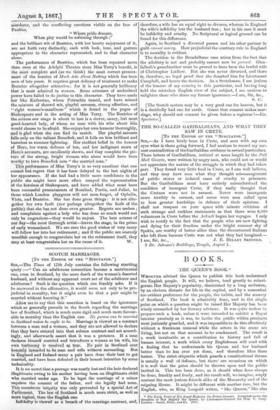SCOTCH MARRIAGES.
[To THE EDITOR OF THE "SPECTATOR."] SIR,—The nines of 17th July contains the following startling query :—" Can an adulterous connection become a matrimonial one, even in Scotland, by the niece death of the woman's deserted husband, and without any apparent overt act of the adulterer and adulteress? Such is the question which one frankly asks. If it be answered in the affirmative, it would seem not only to be pre- judicial to morality, but it might even be that a pair might be married withont knowing it."
Allow me to say that this assertion is based on the ignorance which so generally prevails in the South regarding the marriage law of Scotland, which is much more rigid and much more favour- able to morality than the English one. No person can be married in Scotland unless he ought to be. Marriage is viewed as a contract between a man and a woman, and they are not allowed to declare that they have entered into that solemn contract and act accord- ingly, and afterwards assert that it was a pretence. If a man declares himself married and introduces a woman as his wife, his own testimony is received as true. No pair in Scotland ever honestly intended to be man and wife without succeeding. But• in England and Ireland many a pair have done their best to get married, and have been defeated in their honest intention by some technicality.
It is no secret that a peerage was nearly lost and the heir declared illegitimate owing to his mother having been an illegitimate child who married under age. To be legal the marriage of a minor requires the consent of the father, and she legally had none. This monstrous iniquity was only prevented by a special Act of Parliament. The law of Scotland is much more strict, as well as more logical, than the English one.
Infidelity is viewed as a breach of the marriage contract, and, therefore, a wife has an equal right to divorce, whereas in England the wife's infidelity lets the husband free ; but in his ease it must be infidelity and cruelty. No Scriptural or logical ground can be found for this difference.
Again, in Scotland a divorced person and his other partner in guilt cannot marry. How prejudicial the contrary rule in England is to morality is evident.
The decision in the l3readalbane case arises from the fact that the adultery is not and probably cannot now be proved. Glen- falloch's grandmother must be proved to have been the lawful wife of Christopher Ludlow. But she was never divorced, and there is, therefore, no legal proof that she deserted him for lieutenant Campbell, and hence the decision. As a Seotehman, I am jealous of the honour of my country in this particular, and having long held the mistaken English view of the subject, I am anxious to enlighten those who share my former ignorance.—I am, Sir, &c.,
S. C.
[The Scotch system may be a very good one for heaven, but it is a decidedly bad one for earth. Grant that consent makes mar- riage, why should not consent be given before a registrar ?—En. Spectator.]






























 Previous page
Previous page